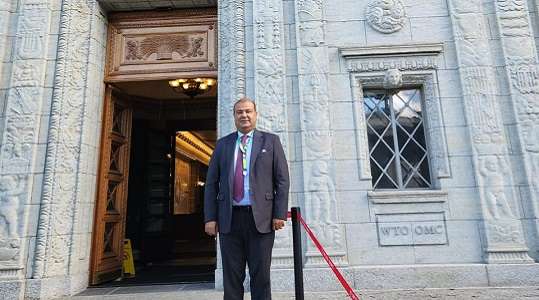The Secretary-General of the Union of Arab Chambers, Dr. Khaled Hanafi, participated in the general meetings of the World Trade Organization held in Geneva - Switzerland, during the period 12-15 September, under the title: “It is time to act,” in the presence of ministerial and economic figures from all over the world. Countries of the world. The 2023 General Forum examined how trade can contribute to making the environment a greener and more sustainable future, by facilitating access to environmental goods, services, and technologies and maintaining the ambition to limit temperature rise to 1.5 degrees above pre-industrial levels.
During his visit, the Secretary-General of the Union met with a number of officials from the World Trade Organization, where he proposed the idea of the Union of Arab Chambers joining the World Trade Organization as the true representative of the Arab private sector. The idea received initial support from the relevant officials in the World Trade Organization, with the mechanisms for joining the organization subsequently being put into effect.
The Secretary-General of the Union considered that “the Union of Arab Chambers’ accession to the World Trade Organization will have a positive impact on the Arab private sector, as the Union has placed at the core of its interests since its establishment the priorities of promoting intra-Arab trade and enhancing Arab trade with the rest of the world. Therefore, the Union’s accession to this global organization will help it achieve its priorities that benefit the Arab chambers as well as the economies of the Arab countries.”
The Secretary-General of the Union participated in the 63rd session of the World Trade Organization meetings, which were held under the title: “Comprehensive Policies to Promote Green Trade: The Role of the Arab Private Sector in Saving the Planet,” on September 14.
He delivered a speech at this session, in which he considered that “the private sector plays a major role in the upcoming climate change, through innovation, investment in renewable energy, and corporate sustainability,” stressing that “reduction and consumer awareness are all areas in which the private sector is considered the basis.”
He considered that "the basic stage in achieving the goals of climate change and sustainability are the sustainable measures announced and implemented by companies to control and reduce greenhouse gas emissions with the aim of reaching net zero emissions by the middle of the century."
Dr. Khaled Hanafi explained that “The Arab world faces great challenges in the field of sustainability in achieving social, economic and environmental goals, especially with regard to issues: extremely dry climate, severe water scarcity, high energy consumption and the pollution of the oil and gas industry.” Pointing out that, “In order to address the multi-faceted environmental, social and economic problems in the region, ensuring a more comprehensive role for the private sector will be key to supporting the sustainable green transformation in the Arab world, while the public sector works to provide an enabling environment.” Stressing that "the private sector must bear responsibility by increasing investment in the areas of digitization, green investment, energy transition, green financing and benefiting from the changing technological and environmental world."
He said: “With regard to renewable energy projects, the Arab countries have high potential for wind and solar energy projects, as the natural conditions are suitable for them, as most Arab countries are part of the Sun Belt. As for the abundance of natural gas reserves, this paves the way for Arab countries to lead green hydrogen projects, especially in light of the growing demand in the region for energy at a compound annual growth rate of 6.8 percent. While the global consumption rate reaches 2.3 percent, which means that the region’s consumption is about three times higher than the average global growth rate.”
The Secretary-General of the Union noted, “Given the annual population growth, there are significant investments in infrastructure as well as growth in the construction and transportation sectors, and therefore diversifying energy sources towards renewable energy sources is essential for the region and its current energy needs.”
He stated, “Arab countries have set goals within their national development agendas, such as Djibouti, Morocco, Jordan, Algeria, and Egypt. The Kingdom of Saudi Arabia and the United Arab Emirates have also announced a target of between 20 and 50 percent renewable energy by 2030. To achieve these goals in the field of renewable energy sources, Arab countries have invested in many projects. The total cumulative investments in renewable energy projects over the past decade (excluding hydropower) amounted to about 15 billion US dollars (7.2 gigawatts), compared to only 1.2 billion dollars. (0.5 gigawatts) in 2008.”

